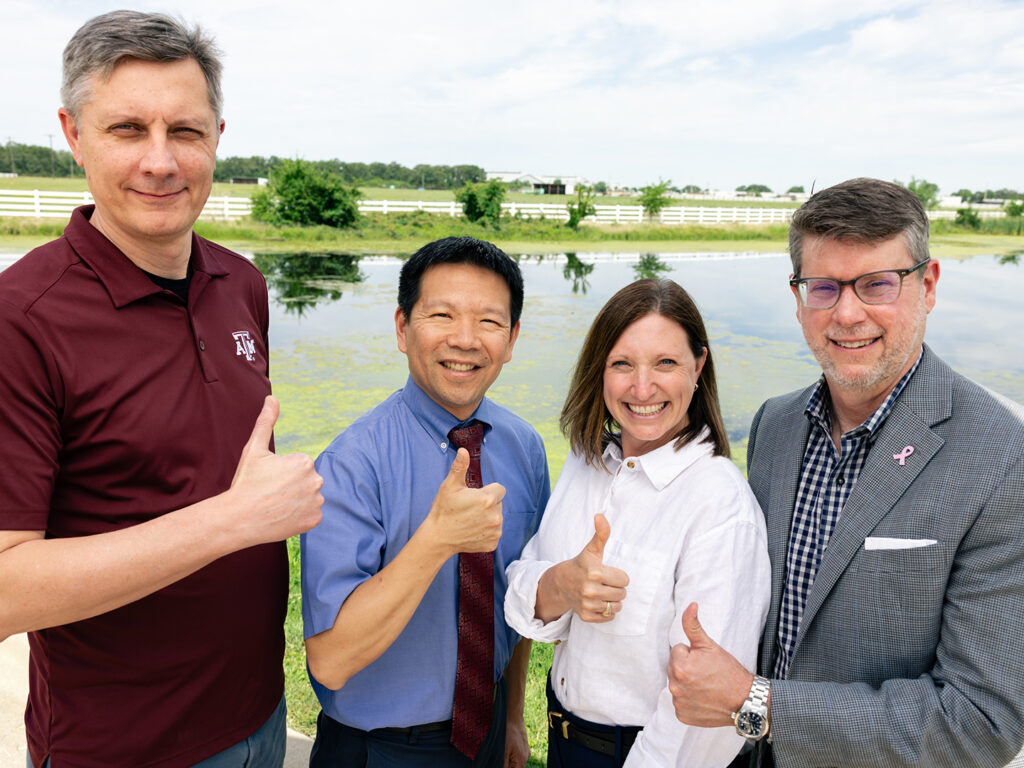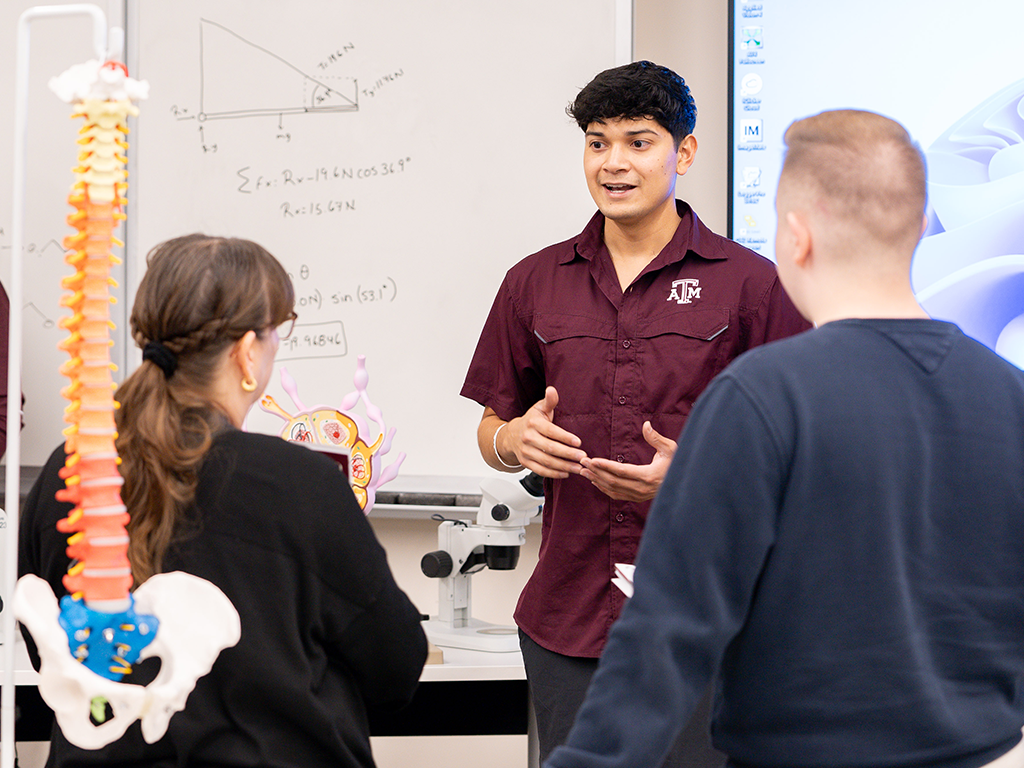VMBS Recognizes 2025 Outstanding Alumni, Rising Star
The Texas A&M College of Veterinary Medicine & Biomedical Sciences (VMBS) recognized five former students at the 2025 Outstanding Alumni & Rising Star Awards Ceremony on June 6.
The Outstanding Alumni Award is the highest honor bestowed by the school and recognizes those who have reached a level of success in their professional careers that brings credit to both the individual and their alma mater. Honorees may be graduates of the Doctor of Veterinary Medicine professional program, graduate academic programs, or biomedical sciences undergraduate program.
Established in 2013, the Rising Star Award recognizes graduates who have completed their education within the last 10 years. These outstanding former students have made significant professional accomplishments early in their careers including public service and volunteer activities that serve to positively reflect upon their alma mater.
“The commitment to excellence and the principles each recipient lives and practices by within their professions, their communities, and their respective fields are a credit to the educational standards of our college,” said Dr. John R. August, the Carl B. King Dean of Veterinary Medicine. “We are extremely grateful for the outstanding examples they set and the inspiration they provide for future generations of VMBS students and former students.”
Videos about each of the award recipients are available on YouTube and more photos from the ceremony are available on Photoshelter.
Outstanding Alumnus: Dr. Ryan N. Doan ‘13
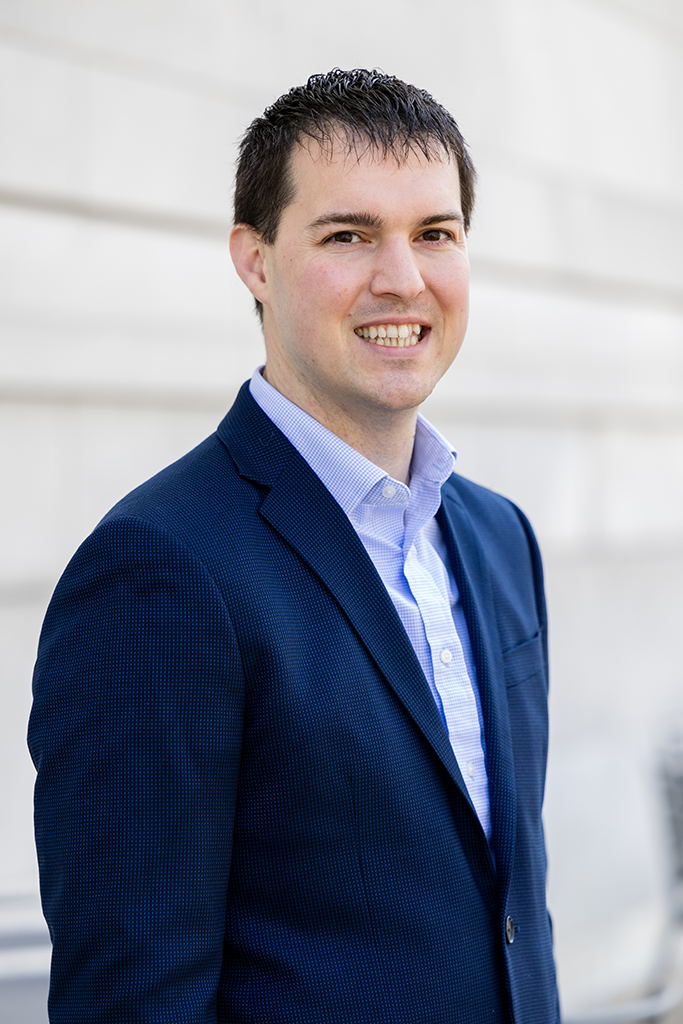
Dr. Ryan N. Doan conducts groundbreaking research on the genetic causes of neurodevelopmental disorders — including Autism Spectrum Disorders (ASD) and attention deficit hyperactivity disorder (ADHD) — while working in one of the most selective academic environments in the world.
Doan received his bachelor’s degree in cell biology and biochemistry from Bucknell University in 2009. In 2013, he completed his Ph.D. in genetics at the Texas A&M College of Veterinary Medicine & Biomedical Sciences (VMBS), where he worked in the lab of Dr. Scott Dindot.
While Doan initially came to the VMBS to study veterinary animal genetics, he was able to play a fundamental role in the progression of drug research on a rare human disorder called Angelman syndrome as a graduate researcher; through this experience, he developed a passion for studying the genetic mechanisms governing neural development.
Even as the focus of his own research began shifting toward human medicine, Doan’s nominators note that he made important contributions to veterinary medicine during his time at the VMBS, including the development of tools for assessing copy number variants — differences in the number of gene copies that can change from individual to individual — in cattle and horses.
“Ryan was using cutting-edge techniques as a graduate student in the Dindot laboratory,” one nominator wrote. “He led the work to sequence the first genome of an American Quarter Horse and also helped us develop methods for assessing the mechanisms that control gene expression within the white blood cells of neonatal foals, which, at the time, were novel techniques in equine research.”
After his doctoral work, Doan completed a postdoctoral research fellowship at Harvard Medical School and Boston Children’s Hospital with renowned scientist Dr. Christopher Walsh while also completing the two-year Clinical Molecular Genetics fellowship through the Harvard Medical School Genetics Training Program. He received his American Board of Medical Genetics and Genomics certification in clinical molecular genetics in 2019.
Today, Doan is an assistant professor of pediatrics at Boston Children’s Hospital and Harvard Medical School, where his research group focuses on the genetic mechanisms behind complex disorders like ASD and ADHD. His goal is to develop methods for providing early diagnoses and, ultimately, interventions for families.
In addition, Doan is co-primary investigator at the Allen Discovery Center for Human Brain Evolution, which he helped to create. He also served as a clinical molecular geneticist in pathology at Brigham and Women’s Hospital, specializing in reproductive cell genetic testing for individuals with cancer or known family risks of cancer, underscoring his commitment to bridging the gap between research and the clinic.
Doan’s expertise lies in a challenging field of research that seeks to understand which parts of DNA contribute to the manifestation of ASD, ADHD, and other related neurodevelopmental disorders. To do so, he has developed innovative techniques for genomic sequencing, analyses of large amounts of genetic data, and functional characterization of new genes and genetic variants.
As part of his work, he has also developed innovative genomic sequencing approaches to identify and quantify genetic variation across tissues. These methods have been applied to study aneurysms and tears in the aorta and, in collaboration with other groups, healthy tissues, neurodevelopmental disorders, dementia, brain tissue abnormalities, human prion disease, and diseases that cause epilepsy.
His work has also helped to advance scientific understanding of the differences between parts of DNA that code for genes and those that do not — formerly known as “junk DNA” — and has developed new methods for analyzing these segments, which can be difficult to distinguish. These studies have provided novel insights into ASD risk arising from the non-coding portion of the genome.
Doan collaborates with clinicians across several departments to recruit families with pediatric disorders like ADHD and OCD, perform clinical-grade sequencing, and provide diagnoses. He leverages advanced tests, including cell and mouse-based functional modeling, to further investigate novel genetic variation. As a result of his cutting-edge work, Doan’s lab has recently provided some of the first direct evidence for a genetic basis for childhood ADHD.
The high impact of Doan’s work is demonstrated by his many publications in journals beyond the ASD and ADHD research fields — including JAMA Pediatrics, Nature, Cell, Nature Genetics, and Nature Neuroscience — and by the invitations he’s received to present at national and international scientific conferences.
Among the numerous research, new investigator, and training awards he has received is the Bridge to Independence Award, presented by the Simons Foundation Autism Research Initiative, the largest private sponsor of autism research in the world. This prestigious award is highly competitive, with applicants from around the world, and is only bestowed upon the most promising scientists poised to make significant advancements in the field.
Despite the pressures of working at one of the most academically rigorous institutions in the world, Doan prioritizes inspiring the next generation of scientific and medical researchers. He continues to enthusiastically mentor students and faculty, ranging from high school hospital interns to post-doctoral researchers.
“Ryan’s unique ability to combine his knowledge of genomics and clinical genetics expertise has led to groundbreaking discoveries that hold the potential to reshape our understanding of genetics and genomics and how they cause debilitating neurological conditions that affect thousands of individuals,” another nominator said. “I am confident that his work will continue to inspire and lead the way for future advancements in the field.”
Beyond his commitment to his research, Doan enjoys spending his free time with his wife and son. Having grown up on a small family farm in rural Pennsylvania, Doan has always enjoyed being outdoors and having a large garden. He brought this passion to Boston, where he built a large garden and enjoys teaching his son important skills in the garden.
Outstanding Alumnus: Dr. Guy W. Johnsen ’75
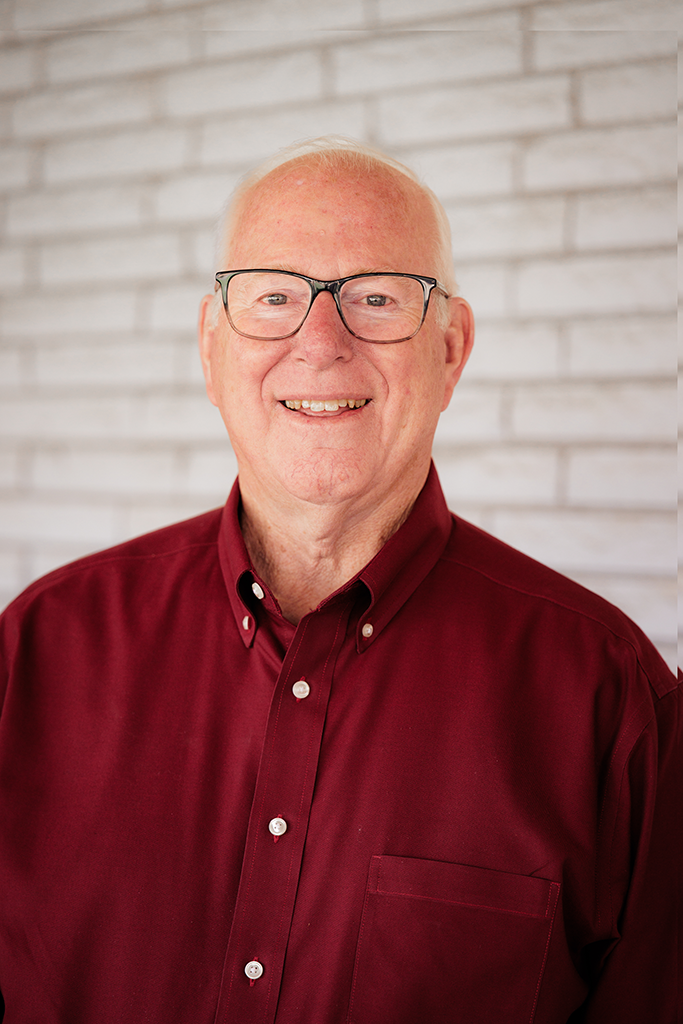
Dr. Guy W. Johnsen has dedicated his veterinary career to serving the people and animals in his hometown of El Paso as a clinician, community leader, and vital contributor to the region’s nationally recognized veterinary medical association.
After graduating high school, Johnsen remained in his hometown to earn a bachelor’s degree in biology from the University of Texas at El Paso (UTEP) in 1971. He then began a masters in parasitology at UTEP before being transferring to Texas A&M University for a second bachelor’s degree in veterinary science, which he earned in 1974, and his Doctor of Veterinary Medicine degree, which he earned in 1975.
Upon graduation, Johnsen began his veterinary career working in two mixed-animal practices in El Paso, followed by a brief period of performing house calls for small animals and working at the local livestock sale barn.
In 1978, Dr. Johnsen and his wife, Kathy, opened Johnsen Animal Hospital, treating primarily dogs, cats, and exotic pets. Based on the hospital’s design appeal, art, and separate entrances for dog and cat owners, Johnsen Animal Hospital was awarded Veterinary Economics’ Hospital Design of the Month in 1979.
Johnsen served as hospital director and president of Johnsen Animal Hospital for 38 years before selling the practice in 2016. He then continued to serve his community as a relief veterinarian, animal shelter surgeon, and consultant until his retirement in 2019.
“Guy has always been able to maintain a balance between practice life and organized veterinary medicine,” another nominator said. “He has been an inspiration to many young veterinarians in El Paso and has set an example for all of us to follow.”
Early in his career, Johnsen’s first employer, Dr. John R. “Pinky” Edwin, encouraged his attendance and service in the local El Paso Veterinary Medical Association (EPVMA). Throughout the years, Johnsen would go on to hold numerous key leadership roles with the EPVMA, including serving in every office and committee constitutionally possible at least once.
“Dr. Johnsen is an outstanding veterinarian, entrepreneur, and community activist who importantly recognized that El Paso, being somewhat isolated in far West Texas, needed to be a progressive veterinary medical association,” one nominator said. “Using his superb leadership skills, Guy organized, led, managed, and sustained the EPVMA for decades, such that EPVMA has become a national example of what a local VMA should and can be — an organization that serves not only the profession but also the public and their animals.”
One of Johnsen’s most notable accomplishments was establishing and organizing the nationally recognized EPVMA Community Awards Banquet in 1986, designed to bring together all the animal-related agencies within the community.
“The banquet has become a landmark for bringing the veterinary and animal communities together to celebrate veterinary medicine,” another nominator said.
Now in its fortieth year, the banquet has gained notoriety in Texas, New Mexico, Arizona, and Oklahoma and has become the only local VMA meeting on the American Veterinary Medical Association’s presidential visitation agenda for the last 20 years.
Another of Johnsen’s most notable accomplishments was co-founding the El Paso Animal Hall of Fame in 1998 alongside his colleague Dr. Jim Koschmann.
In addition to the EPVMA, Johnsen has served in numerous leadership positions for the Texas Veterinary Medical Association (TVMA) over the years, including as president in 1999. He participated in task forces that helped develop the Southwest Veterinary Symposium, which has become one of the leading veterinary conferences in the country, and the Veterinary Assistant Training and Certification Program.
Over the years, Johnsen also freely gave his time to leadership roles within the Texas State Board of Veterinary Medical Examiners and the American Veterinary Medical Association.
“Guy is someone whom I looked up to immediately because of his commitment to the veterinary profession and the collegiality he showed for all the people he worked with,” another nominator said. “His unwavering commitment to service above self and showing what leadership should look like makes him not only an outstanding alumnus but also an individual whom I am proud to call a colleague, brother, and Aggie.”
Johnsen has received several awards from the TVMA over the years, including the President’s Award in 1996, the Companion Animal Practitioner of the Year Award in 1998, and the Lifetime Membership Award in 1999. He has also been honored by the EPVMA with the Special Recognition Award in 1999 and the 21st Annual Veterinary Community Award in 2006.
Outside of the veterinary profession, Johnsen has continued to live selflessly through numerous other volunteer and leadership positions to serve his family, community, and church. His passion for collaboration and teamwork is now also evidenced in his retired life as he works with shelters, rescues, veterinary hospitals, and politicians to help suppress contagious diseases and reduce pet overpopulation.
“Guy is a motivated, hard-working, servant leader who gives of his time without hesitation,” another nominator said. “He is an exceptional example of what makes veterinary medicine a wonderful profession, and he sets the standard for what it means to be an Aggie.”
Reflecting on his successful career, Johnsen credits his Lord and Savior, Jesus Christ, his wife of nearly 54 years, Kathy, and his children, Mark and Erin.
Outstanding Alumnus: Dr. Tim R. Turner ‘74, ‘76, ‘77
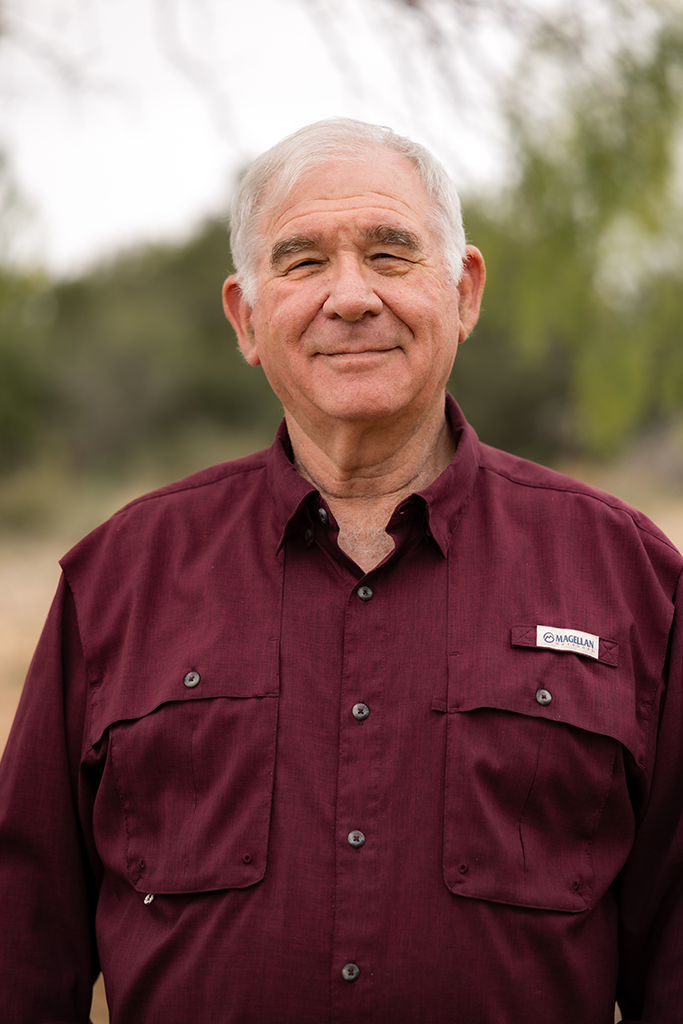
Dr. Tim R. Turner is a visionary veterinarian, innovative entrepreneur, and passionate advocate for rural veterinary medicine. A leader in his field, Turner has dedicated his life to advancing the livestock industry, mentoring young professionals, and serving his community.
Raised on his family’s ranch in Water Valley, Texas — with roots dating back to 1877 — Turner developed a deep appreciation for animals, agriculture, and the people who dedicate their lives to both. Inspired by his father’s veterinary career, Turner pursued the same profession at Texas A&M, earning a bachelor’s degree in finance in 1974, a bachelor’s degree in veterinary science in 1976, and a Doctor of Veterinary Medicine degree in 1977.
After completing his studies, Turner returned to his family ranch, combining his education and entrepreneurial spirit to address gaps in the livestock industry. In 1980, he purchased Southwestern Livestock Mineral Co. — a company that develops custom mineral supplements that have revolutionized livestock nutrition.
By personally delivering products to clients, Turner forged deep relationships and gained a firsthand understanding of the unique challenges faced by his community. These connections, coupled with his expertise and innovation, solidified his reputation as a trusted leader and pioneer in his field.
“Tim is considered an icon in mineral supplementation for livestock and the livestock production industries,” one nominator said. “His expertise has made a significant impact on the sheep, goat, and beef product industries.”
Turner’s leadership goes beyond his entrepreneurial success. He has held pivotal roles in organizations such as the Texas Sheep and Goat Raisers’ Association, the Texas Veterinary Medical Association, and the Texas and Southwestern Cattle Raisers Association, through which he tackled industry challenges and advocated for agricultural communities.
Equally committed to serving on a local level, Turner has led parent-teacher association boards, school boards, and civic organizations, demonstrating his belief in the importance of giving back to his community.
“Dr. Turner has not and does not do anything halfway — he truly gives himself in everything he does,” another nominator said. “His dedication to his profession, the agriculture industry, and the people he serves is unmatched.”
A dedicated family man, Turner has always prioritized the people closest to him. When his daughters, Tara and Amanda, attended Texas A&M, he expanded his client base in Bryan-College Station, ensuring he could remain close to them while conducting business. Today, Tara manages the family’s feed mill and Amanda oversees ranch operations, continuing the legacy of excellence and dedication that has defined the Turner family for nearly 150 years.
Central to Turner’s success is his wife, Judy, who has been an equal partner in every endeavor. Together, they have not only built a thriving business but also cultivated a legacy that reflects their shared dedication to making a difference. The duo’s passion is perhaps best exemplified in their support of Texas A&M’s Rural Veterinary Practice Preclinical Externship program, for which they generously provided funding that allows Aggie veterinary students to gain invaluable hands-on experience in rural communities.
“The Turners’ understanding that the future of veterinary medicine lies in empowering the next generation is priceless,” one nominator said. “By giving students the opportunity to immerse themselves in rural communities, they’re not just addressing critical shortages in veterinary care; they are also inspiring young professionals to see the immense value and fulfillment of serving in these areas. Their generosity and vision are planting seeds for lasting change in the profession.”
This dedication to advancing veterinary education and fostering innovation was further demonstrated through Turner’s involvement with the Veterinary Innovation Summit at Texas A&M. As an early advocate and supporter of the program, Turner did not just participate in program discussions; he also provided financial support that gave students the opportunity to engage with groundbreaking ideas and emerging advancements in the field.
Whether mentoring students, supporting his community, or cherishing family milestones, Turner exemplifies the Aggie core values in every aspect of his life. His story is not just one of success but a powerful testament to the enduring impact of a life defined by purpose, connection, and unwavering dedication.
“Tim is the kind of person who invests in and loves people unconditionally,” another nominator said. “He has helped countless individuals across our community and beyond. He is the kind of person you don’t just meet one time — he becomes a lifelong friend and family.”
Turner lives on his ranch in Water Valley with his family, where he and his wife, Judy ’78, continue to play an active role in their community and enjoy spending time with their grandchildren.
Outstanding Alumnus: Dr. Oscar J. “Bubba” Woytek ’65
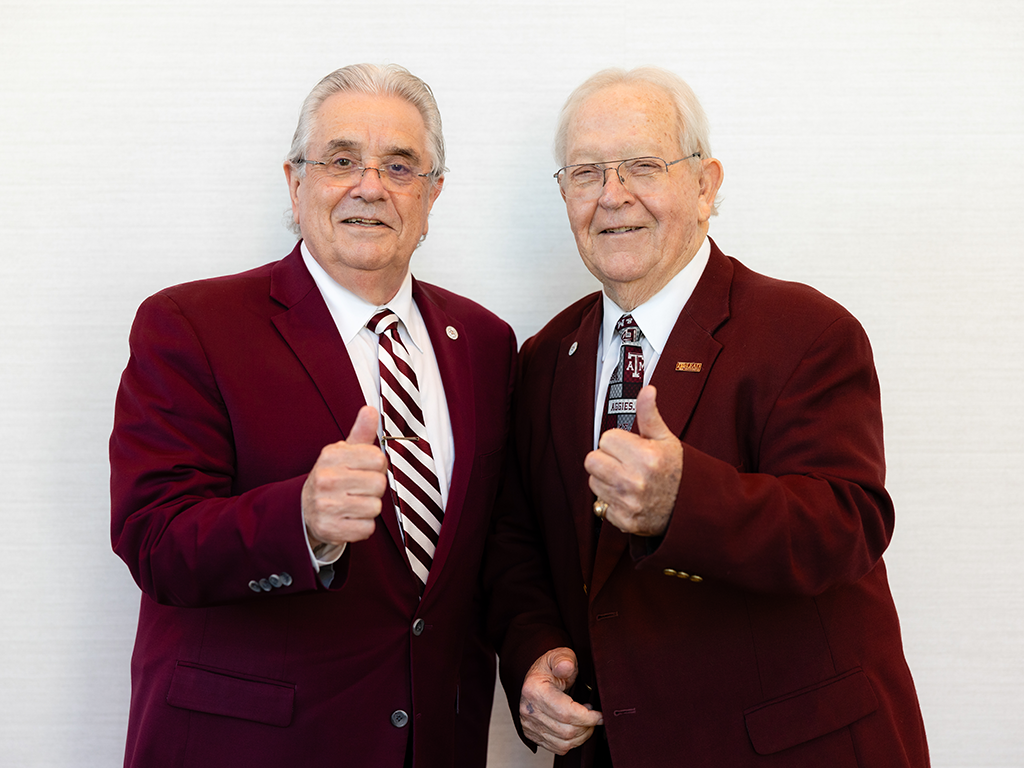
By dedicating nearly 35 years to fundraising for the Texas A&M College of Veterinary Medicine & Biomedical Sciences, Dr. Oscar J. “Bubba” Woytek has used his career to make a long-lasting impact on veterinary medicine, education, and his alma mater.
Woytek earned both his bachelor’s degree in veterinary science and his Doctor of Veterinary Medicine degree, in 1964 and 1965, respectively, from Texas A&M. He then served in the United States Air Force Veterinary Corps for two years, achieving the rank of captain.
In 1967, Woytek became a partner at Loop 410 Veterinary Hospital, a small animal practice in San Antonio. He also conducted a family ranching business in Hallettsville, Texas.
“From the first day I met Dr. Woytek and through the years that have followed, I have considered his mentorship and friendship integral to becoming the practitioner that I am today,” one nominator said. “In his practice days, he was an excellent veterinarian and surgeon, but most of all, he had a gift for making people feel appreciated and at ease.”
Woytek’s career trajectory shifted in 1989 when he accepted a position with the Texas A&M Foundation, becoming the first veterinarian to serve as a development officer at a college of veterinary medicine in the U.S. During his tenure, he and his colleagues raised more than $515 million to support the VMBS.
“The dollar contribution that Bubba has raised is staggering, with over $350 million dollars in granted gifts personally attributed to him,” another nominator said. “The planned gifts he helped establish initially exceeded all the other A&M colleges and the Corp of Cadets combined. The goodwill that Bubba created for the VMBS and for Texas A&M can’t be quantified, but I would venture to say the value is huge.”
In his first capital campaign, Woytek single-handedly surpassed the college’s $29 million goal, raising $30 million, and in the second, he helped raise more than $100 million. Recently, he and the VMBS development team raised approximately $300 million for the college, the second highest amount raised on campus.
This work has grown the number of VMBS scholarships from 10 to 860, expanded the college’s endowment to more than $134 million, and created 24 new endowed chairs.
“What is really important is how these funds impact the lives of the students we graduate at Texas A&M,” another nominator said. “These funds have built facilities and bought equipment; endowed chairs to acquire and retain our outstanding administrators, professors, and researchers; and provided approximately $2 million in scholarships annually to our students to help keep the cost of a veterinary education affordable.”
Woytek is especially proud of his key role in establishing the Texas A&M Stevenson Companion Animal Life-Care Center in 1993. This unique facility has provided a home for more than 166 pets whose owners have passed away or otherwise become unable to care for them.
Woytek retired from the Texas A&M Foundation in December 2024, and in discussing his accomplishments, he has maintained that the job was always about more than money — it was about forming connections over a shared love for veterinary medicine. In the end, his opportunities to help people were what made the job valuable to him.
“A sweeter, more caring man has not been created,” another nominator said. “Couple his wonderful nature with his devotion and tireless efforts for the College of Veterinary Medicine & Biomedical Sciences and it is understandable how he was able to get the results he achieved.”
A true Aggie at heart, service has always been important to Woytek; he has dedicated his time to leadership positions with the Northeast School District in San Antonio and the Northeast YMCA; to the Harmony Hills Optimist Club and the San Antonio A&M Club; and a number of veterinary-affiliated organizations, including serving as president of the Bexar County Veterinary Medical Association, on the board of directors for the Texas Veterinary Medical Association, and on the executive board for the American Animal Hospital Association.
Woytek was also instrumental in helping create the Association of Veterinary Advancement Professionals, for which he has served as president and on the executive board.
“I know of no one who exemplifies every one of Texas A&M’s core values every single day as Bubba does,” another nominator said. “Bubba defines what an Aggie is meant to be.”
Woytek has been recognized with the United Way Merit Award – Veterinary Division and the Texas A&M Foundation Trustee Award. He was also honored by donors, who named a Fellowship for Clinical Research and two endowed scholarships after him.
Woytek is in the process of moving from College Station to Hallettsville with his wife, Jane. They have three children, Charles, David, and Jillaine. The family enjoys spending time at their ranch and visiting Aggieland as much as possible, where they are proud members of A&M United Methodist Church.
Rising Star: Dr. Jessica Y. Rodriguez ‘05, ‘09, ‘17
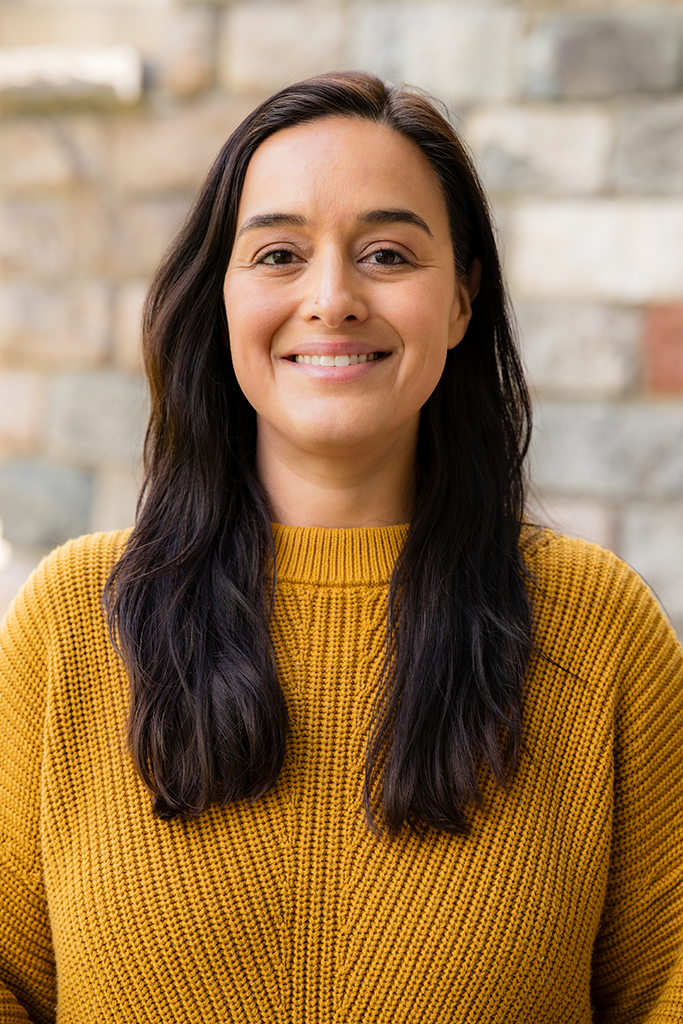
As an emerging leader in the global field of veterinary parasitology, Dr. Jessica Y. Rodriguez leads the development of new anti-parasitic treatments for companion animals and provides educational support for veterinarians and students at all career stages.
A three-time Aggie, Rodriguez received her bachelor’s degree in biomedical sciences in 2005, followed by her Doctor of Veterinary Medicine (DVM) degree in 2009. She completed an internship in small animal medicine and surgery at the University of Tennessee and then returned to Texas A&M, where she completed a combined residency and Ph.D. program in veterinary pathobiology, funded by the National Center for Veterinary Parasitology, in 2017.
“The NCVP residency is one of the most competitive and selective residency programs in the United States, as there are a limited number of spots that are only available every three to four years,” one nominator said. “The fact that Dr. Rodriguez was selected as an NCVP resident speaks highly to her academic and scholarly accomplishments in veterinary parasitology.”
After completing her Ph.D. and residency, Rodriguez passed the American College of Veterinary Medicine specialty boards in veterinary parasitology just a few months later, an impressive and significant accomplishment considering the rigor of ACVM specialty boards.
“Dr. Rodriguez was a model student in our graduate program and is a real asset to the veterinary profession,” another nominator said. “I’m a real cheerleader for Jessica because she is the ‘whole package’ in terms of academic performance, scientific knowledge, professionalism, and collegiality.”
With her training complete, Rodriguez joined Zoetis — the largest American producer of medicine and vaccines for pets and livestock — as a field veterinary specialist in companion animal parasitology. During her four years in this role, she delivered continuing education focused on parasitology to veterinarians across the U.S.
In addition to local and regional events, Rodriguez also regularly presented CE on the national stage as a regular speaker at the American Veterinary Medical Association Convention, the Veterinary Meeting & Expo, and the Western Veterinary Conference.
“Dr. Rodriguez is an excellent CE presenter, imparting relevant scientific information and guiding veterinarians through the challenging aspects of practice within parasitology,” another nominator said. “These are arguably the three largest CE opportunities for veterinarians and they demonstrate the tremendous impact that Dr. Rodriguez has as a popular repeat speaker at each conference over the years.”
In 2021, Rodriguez transitioned to a senior principal scientist role within Zoetis, where she works with teams of scientists as a subject matter expert and clinician on several research and development projects in parasitology. She also serves as a project team lead where she is responsible for the overall strategy and progression of certain projects. Her work advances animal health, with a focus on parasite treatment, control, and prevention. A portion of her research assesses the extent of potentially drug-resistant populations of canine heartworms in the U.S. — a major threat to companion animals and a significant issue facing veterinarians in parts of the U.S.
Despite these increased responsibilities, Rodriguez also makes time to give back to her profession and scientific community in many ways, including by serving a three-year term as the chair of the American Association of Veterinary Parasitologists Electronic Media Committee from 2019-2022. Rodriguez was also elected by her peers to serve on the AAVP Nominating Committee, a testament to the membership’s confidence in her leadership and abilities, and she now also serves as a member of the AAVP Diversity, Equity, and Inclusion Committee.
“Jessica’s many service roles serve as a testament to her commitment to our profession and field of study,” another nominator said. “She has continuously shown strong leadership within our field with direct and indirect positive impacts on veterinary parasitology and our beloved animals.”
Additionally, Rodriguez serves as the Zoetis representative for the industry sponsor seat on the National Center for Veterinary Parasitology, which oversees the only veterinary parasitology residency program in the U.S. She served as an Angoff assessor for the ACVM board examination for the veterinary parasitology subspecialty, and has also generously volunteered her time to give back to trainees and graduate students by participating in an after-hours mentoring panel for busy students interested in careers in academia.
“Dr. Rodriguez is a shining example of the core Aggie value of Selfless Service,” another nominator said. “What makes her a rising star is that she has demonstrated this tremendous impact on the field of veterinary medicine and parasitology within just seven years of completing her Ph.D. at Texas A&M.”
Rodriguez resides in Kalamazoo, Michigan, where she enjoys spending quality time with her family, including her nephew and two nieces. She also enjoys spending time outdoors with her partner and dogs, and especially relishes time spent fishing in Texas in the Lower Laguna Madre.
###
For more information about the Texas A&M College of Veterinary Medicine & Biomedical Sciences, please visit our website at vetmed.tamu.edu or join us on Facebook, Instagram, and Twitter.
Contact Information: Jennifer Gauntt, Director of VMBS Communications, Texas A&M College of Veterinary Medicine & Biomedical Sciences, jgauntt@cvm.tamu.edu, 979-862-4216
You May Also Like

